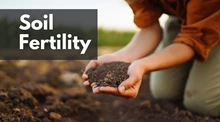
Spiti Valley, a remote tribal region in the western Himalayas, is an integral part of India's cold deserts. Despite the harsh climatic conditions, apple cultivation has emerged as a significant economic activity for the local farmers. The quality of apples produced in Spiti is exceptional, fetching high prices in the market. However, with the increasing area under apple cultivation, farmers face challenges, notably the infestation of woolly apple aphids.
Threat of Woolly Apple Aphid
The woolly apple aphid (Eriosoma lanigerum) is one of the most destructive pests of apple trees worldwide. In India, this pest is specific to apple and crab apple trees, first recorded in Conoor in 1889, and later in the Kumaon and Shimla hills. These aphids cover their bodies with woolly filaments of wax, making them easily identifiable.
The aphid primarily attacks the roots but also infests trunks, branches, stems, twigs, leaf petioles, and fruit stalks. The feeding zone around the tissues undergoes excessive cell division and elongation, forming galls or knots that may split and become entry points for pathogens. This severe galling interferes with nutrient uptake, reducing the tree's vitality and yield.
Infested plants display pale green leaves and cottony patches on stems and branches. The nymphs and adults suck sap from the branches, twigs, and roots, causing stunted growth and reduced bearing capacity. Young trees may become so weakened that they can be easily uprooted by strong winds. Fruits from heavily infested trees are often undersized, malformed, and insipid in taste.
Natural Farming: A Sustainable Solution
Natural farming, which emphasizes traditional indigenous practices and excludes synthetic chemicals, has been adopted in Himachal Pradesh through the Prakritik Kheti Khushhal Kisan Yojana (PK3Y). This method integrates crops, trees, and livestock, promoting biodiversity and ecological balance.
In Spiti Valley, a homemade pesticide known as Agniastr is used under natural farming practices to combat woolly apple aphids. Agniastr is made from cow's urine, a local herb called Thuklang (Hyoscyamus niger L.), tobacco powder, green chili paste, and garlic paste. Thuklang, also known as henbane or black henbane, is rich in alkaloid compounds like hyoscyamine and scopolamine, which have insecticidal properties.
Preparation and Application of Agniastr
To prepare Agniastr, crushed leaves of Thuklang, tobacco powder, green chili paste, and garlic paste are mixed with cow's urine and cooked at a low flame until boiling. The solution is then left for 48 hours, stirred periodically, and diluted for application. This mixture must be used within three months of preparation.
Efficacy of Natural Farming
Studies conducted at the Regional Horticulture Research Sub-station and Krishi Vigyan Kendra in Lahaul & Spiti II demonstrated that natural farming effectively suppresses woolly apple aphid populations. The trials showed a significant decline in aphid populations while maintaining the population of parasitoid wasps, which are natural predators of the aphids.
Conventional farming using synthetic pesticides, while effective against aphids, also destroyed beneficial parasitoid wasps. In contrast, natural farming methods not only controlled aphid populations but also preserved these beneficial insects.
Conclusion
Natural farming practices, particularly the use of Agniastr, offer a sustainable and eco-friendly solution to manage woolly apple aphid infestations in Spiti Valley. This approach reduces the reliance on synthetic pesticides, promotes biodiversity, and increases the net income of farmers by ensuring high-quality apple production. The integration of local herbs and traditional practices underlines the importance of indigenous knowledge in modern agriculture, offering a path towards more sustainable and resilient farming systems.
By adopting natural farming methods on a larger scale, farmers in Spiti Valley can protect their apple orchards from pests while preserving the delicate ecological balance of this unique cold desert region.
(Source: Sumit Vashisth, Sudhir Verma, Subhash C Verma, Inder Dev and Rajeshwar S Chandel; Indian Horticulture, 69(2), For detailed information)











